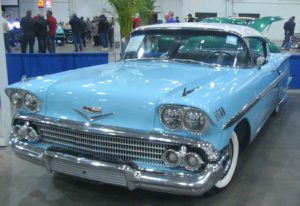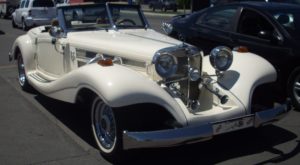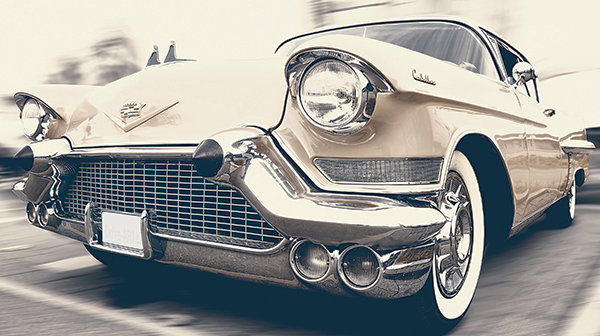Do you have a really old car that you’ve kept in mint condition and rarely drive? Do you know if your vehicle falls under the classic car category? Whether your vehicle is a collector car or an especially prized one, it’s important to have the right coverage. Standard Auto Insurance is not sufficient for a car that is well beyond standard in terms of value. You take pride in keeping your car clean and well-maintained, right? So, you’ll want to have a Classic Car Insurance policy that reflects the gem you have tucked away in the garage. You’ll also want to get paid out fairly if something bad ever does happen to your prized possession.
Unfortunately, many classic car owners are overpaying for insurance, simply because they add their vintage vehicle to their standard Auto Insurance policy. That’s not the best way to get coverage. In fact, it’s probably the most expensive way and you could be paying over 20% more than you need to be. Keep reading to see how you can find great Classic Car Insurance coverage for a low rate.
Why Should I Buy Classic Car Insurance?
The sad truth is that when you get into a car accident, you always lose something even if you’re fully covered by your insurance policy. This is because a normal car depreciates in value as soon as it’s driven off the lot. For example, say you bought a Honda Civic for $20,000 five years ago and totaled it today on the freeway. Time has passed so your car may only be worth $12,000 or less now. That means that your insurer is only going to pay you for what the car is worth today, not what you bought it for. In fact, you’ll never get paid out for more than a car’s worth at the time, even if you paid a million dollars for it. You’ll only get the actual cash value of the car on the day it was totaled.
 But, what if your car doesn’t depreciate in value because it’s a rare classic car? What if it actually appreciates with time? Unlike other cars you use to drive to work or school, collectible cars increase in value if they are maintained and/or restored properly. That’s why regular Auto Insurance is insufficient.
But, what if your car doesn’t depreciate in value because it’s a rare classic car? What if it actually appreciates with time? Unlike other cars you use to drive to work or school, collectible cars increase in value if they are maintained and/or restored properly. That’s why regular Auto Insurance is insufficient.
You see, if you have Classic Car Insurance, then you’re covered based on an agreed-upon value. This is often referred to in policies as a Guaranteed Value or Replacement Value. This value is the amount both you and your insurance company have agreed upon, not the actual cash value of the car today. To determine an agreed-upon value, you will likely need to get your classic car appraised by a professional. Your insurer will also research how much your car is worth. Basically, if your car’s value is set at $70,000, then that’s how much you’ll be compensated for in the event of a total loss.
Requirements for Classic Car Car Insurance
Keep in mind that not all collector cars or collector Auto Insurance is the same. Below you’ll find the different classifications.
- Mileage. Most insurance companies do not insure cars that are used on a daily basis for driving to work, school, etc. In fact, there are mileage restrictions that vary according to each state. Generally speaking, limits for annual mileage are about 5,000 to 7,000 miles, but it may be even less than that.
- Age. Usually, your car must be 25 years old or older.
- Driving Record. No one wants to insure an expensive car with a driver who had a lot of car accidents. Insurers will often look as far back as 10 years when checking your record. Even having one at-fault accident in the past three years may prevent you from getting your classic car insured.
- Storage. Insurance companies don’t want to hear that you keep your car parked in the driveway, exposed to all the elements. You’ll need to garage the car or find a storage facility.
- Agreement. You will most likely be asked to agree not to race the classic car or expose it to any other types of potential peril.
- Condition. If your car is not in good condition or has been in an accident, insurers will hesitate to insure you. Also, if the car is designed for off-road driving, you will likely not find coverage.
What Type of Classic Car Insurance Do I Need?
Definitions of collectible or classic cars vary depending on state and insurer. However, most policies for these cars are similar, but with different rates.
- Classic Car. Usually, a car in this category can be as new as 10 years old or as old as 50. However, they tend to be around 19 to 25 years old. A classic car is either restored or well-kept and in good condition. These cars have inherent value due to rarity, performance and other factors.
 Antique Car. Depending on state, the age restrictions for antique cars vary. In most cases, a car needs to be at least 20 years old. Most states require them to be at least 25 years old. In all states, the vehicle must be restored or well-maintained and in good condition.
Antique Car. Depending on state, the age restrictions for antique cars vary. In most cases, a car needs to be at least 20 years old. Most states require them to be at least 25 years old. In all states, the vehicle must be restored or well-maintained and in good condition.- Modified Car. If your car has been altered dramatically, inside or out, this will affect the value of the car and categorize it as “modified.” This car type is harder to insure because many companies will not cover cars that have had most stock parts replaced.
- Kit Cars or Replica Cars. These cars are built to resemble a vehicle that is 25 years old or older using newer parts.
- Street Rods or Hot Rods. These cars were made before 1949 and may or may not have been modified.
- Vintage Vehicles. These cars were manufactured from 1919-1930 and may or may not have been modified.
- Veteran Vehicles. These cars were manufactured before 1919.
- Rare Vehicles. This category includes vintage military vehicles, unusual motorsport vehicles, classic motorcycles, and other vintage or antique vehicles like tractors. Limited production models of newer cars also fall in this category.
- Exotic Cars. These vehicles are usually less than 15 years old and are not collectible or classic cars but have the potential to become valuable.
Classic Car Coverage
Much like standard Auto Insurance, Classic Car Insurance has the usual one-year or six-month term for the following types of coverage:
 Liability
Liability- Collision
- Comprehensive
- Medical Payments
- Uninsured/Underinsured Motorist
There are also other types of coverage that are specific to classic cars and other collectible cars:
- Roadside Assistance. This is different from the kind you opt for with a regular car or truck. Roadside Assistance for classic cars includes towing with a flatbed tow truck to prevent damage or wear and tear.
- Traveling Coverage. If your car breaks down, you may be reimbursed for food, rental car and even a hotel stay.
- Auto Show Medical Reimbursement. This covers you if you or anyone at an exhibit showcasing your car gets hurt.
- No Attendance Required. If your car gets damaged at a car show, you will be covered even if you’re not there.
- Coverage for Spare Parts. This coverage applies to backup parts that are separate from the car but used for maintenance or operation of your car. These parts must have established values set before you make a claim in order to be covered.
How Much Does Classic Car Insurance Cost?
 With all the restrictions and rules on mileage for classic cars, you may think insurance costs more. However, the opposite is true as it’s usually much less expensive. Insurers use the same factors in calculating risk to determine your rate, but they also take into consideration the fact that you drive the car less frequently and store it safely. That makes it less likely to get in an accident or damaged, so your rate will be lower.
With all the restrictions and rules on mileage for classic cars, you may think insurance costs more. However, the opposite is true as it’s usually much less expensive. Insurers use the same factors in calculating risk to determine your rate, but they also take into consideration the fact that you drive the car less frequently and store it safely. That makes it less likely to get in an accident or damaged, so your rate will be lower.
Additionally, you should ask an Insurance Specialist about discounts. You may qualify for a multi-vehicle discount if you insure both your regular vehicle and classic car with the same insurance company. Just call (855) 919-4247 today to see if you qualify for a discount.
What If My Car’s Value Goes Up?
Many collectors have this problem. If your classic car’s value increases, you’ll need to speak with your agent to negotiate a new agreed-upon value (Guaranteed Value/Replacement Value) based on car valuation guides and a professional appraisal of your car.
Shop for Classic Car Insurance
Like with standard Auto Insurance, it always makes sense to shop around for Classic Car Insurance. It’s the fastest and easiest way to find the best coverage for the best price. Luckily, we’ll do all the work for you. Our Insurance Specialists work with top companies to find you the lowest rate without sacrificing coverage. Plus, there are no broker fees and our quotes are completely free. With AIS, you can find the best rate in minutes! Call us today at (855) 919-4247 so you don’t overpay for Classic Car Insurance.
Other Important Things to Remember
 Don’t let your insurance lapse even if your car is sitting in the garage or storage facility. A flood or other type of natural disaster could still wreak havoc on your car. Without Classic Car Insurance, you’ll be on your own to pay for damages and repairs.
Don’t let your insurance lapse even if your car is sitting in the garage or storage facility. A flood or other type of natural disaster could still wreak havoc on your car. Without Classic Car Insurance, you’ll be on your own to pay for damages and repairs.- Don’t get the cheapest insurance if it means less coverage. You don’t want a hassle or a disappearing act if you ever have to file a claim.
- Before contacting a trusted Insurance Specialist, take good quality photographs and check the value of your car on Kelley Blue Book or Old Cars Report Price Guide. With these in hand, you’re in a better position to argue your desired Guaranteed Value.
- Check the limited use provisions on your policy to make sure they fit with your plans. You never want to go over the allotted amount of miles. See what travel restrictions are imposed by the policy to ensure you’re covered.
- Avoid agents who work with carriers you’ve never heard of. Most of the top insurers of Classic Cars are the same companies that offer the best Auto Insurance policies, too.
The information in this article is obtained from various sources. This content is offered for educational purposes only and does not represent contractual agreements. It should not replace manuals or instructions provided by the manufacturer or the advice of a qualified professional. The definitions, terms, and coverage in a given policy may be different than those suggested here. Such policy will be governed by the language contained therein, and no warranty or appropriateness for a specific purpose is expressed or implied.
